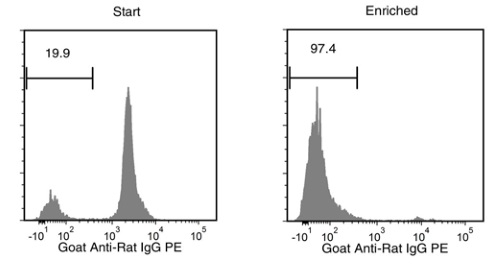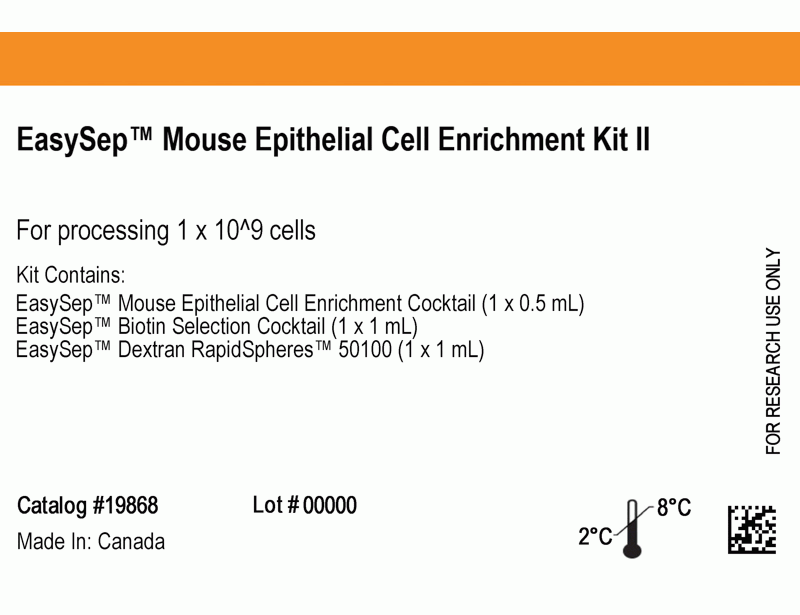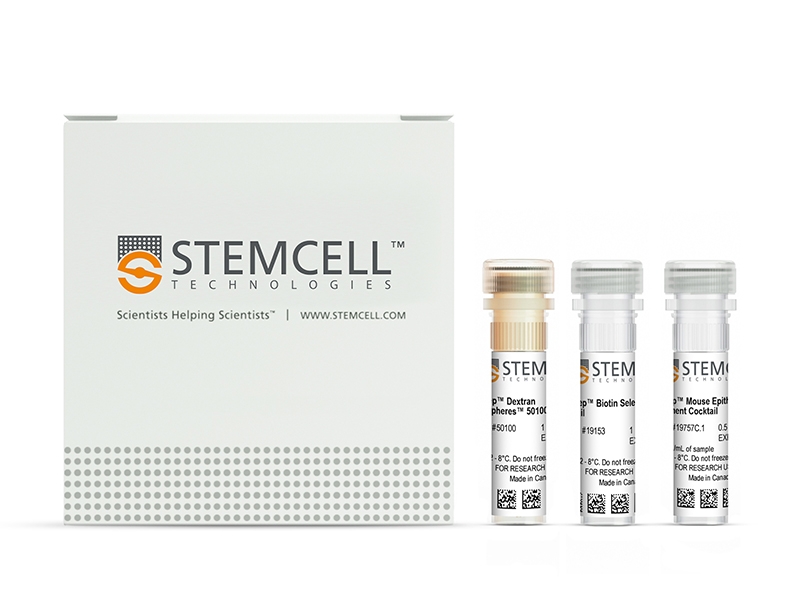EasySep™ Mouse Epithelial Cell Enrichment Kit II
Immunomagnetic negative selection kit
概要
The EasySep™ Mouse Epithelial Cell Enrichment Kit II is designed to isolate epithelial cells from freshly dissociated mouse mammary tissues by immunomagnetic negative selection. The EasySep™ procedure involves labeling unwanted non-epithelial cells with biotinylated antibodies and magnetic particles. The magnetically labeled cells are separated from untouched desired cells by using an EasySep™ magnet and simply pouring the desired cells into a new tube.
This product replaces the EasySep™ Epithelial Cell Enrichment Kit (Catalog #19758) for even faster isolations. It also replaces the cell enrichment portion of the EasySep™ Mouse Mammary Stem Cell Enrichment Kit (Catalog #19757). Additionally, Anti-Mouse CD24 Antibody, Clone M1/69, PE (Catalog #60099PE) and Anti-Mouse CD49f Antibody, Clone GoH3, FITC (Catalog #60037FI) are required to complete the kit.
This product replaces the EasySep™ Epithelial Cell Enrichment Kit (Catalog #19758) for even faster isolations. It also replaces the cell enrichment portion of the EasySep™ Mouse Mammary Stem Cell Enrichment Kit (Catalog #19757). Additionally, Anti-Mouse CD24 Antibody, Clone M1/69, PE (Catalog #60099PE) and Anti-Mouse CD49f Antibody, Clone GoH3, FITC (Catalog #60037FI) are required to complete the kit.
Advantages
• Fast, easy-to-use and column-free
• Isolated cells are untouched
• Isolated cells are untouched
Components
- EasySep™ Mouse Epithelial Cell Enrichment Kit II (Catalog #19868)
- EasySep™ Mouse Epithelial Cell Enrichment Cocktail, 0.5 mL
- EasySep™ Biotin Selection Cocktail, 1 mL
- EasySep™ Dextran RapidSpheres™, 1 mL
Magnet Compatibility
• EasySep™ Magnet (Catalog #18000)
• “The Big Easy” EasySep™ Magnet (Catalog #18001)
Subtype
Cell Isolation Kits
Cell Type
Mammary Cells, Prostate Cells
Species
Mouse
Sample Source
Other, Primary
Selection Method
Negative
Application
Cell Isolation
Brand
EasySep
Area of Interest
Epithelial Cell Biology
技术资料
| Document Type | 产品名称 | Catalog # | Lot # | 语言 |
|---|---|---|---|---|
| Product Information Sheet | EasySep™ Mouse Epithelial Cell Enrichment Kit II | 19868 | All | English |
数据及文献
Data

Starting with mouse mammary tissues, the epithelial cell content of the enriched fraction is typically 96.97 ± 0.54% (mean ± SD using the purple EasySep™ Magnet). In the above example, the percentages of epithelial cells in the start and final enriched fractions are 19.9% and 97.4%, respectively.
Publications (1)
Nature communications 2019
Sterol regulatory element binding protein 1 couples mechanical cues and lipid metabolism.
Abstract
Abstract
Sterol regulatory element binding proteins (SREBPs) are a family of transcription factors that regulate lipid biosynthesis and adipogenesis by controlling the expression of several enzymes required for cholesterol, fatty acid, triacylglycerol and phospholipid synthesis. In vertebrates, SREBP activation is mainly controlled by a complex and well-characterized feedback mechanism mediated by cholesterol, a crucial bio-product of the SREBP-activated mevalonate pathway. In this work, we identified acto-myosin contractility and mechanical forces imposed by the extracellular matrix (ECM) as SREBP1 regulators. SREBP1 control by mechanical cues depends on geranylgeranyl pyrophosphate, another key bio-product of the mevalonate pathway, and impacts on stem cell fate in mouse and on fat storage in Drosophila. Mechanistically, we show that activation of AMP-activated protein kinase (AMPK) by ECM stiffening and geranylgeranylated RhoA-dependent acto-myosin contraction inhibits SREBP1 activation. Our results unveil an unpredicted and evolutionary conserved role of SREBP1 in rewiring cell metabolism in response to mechanical cues.


